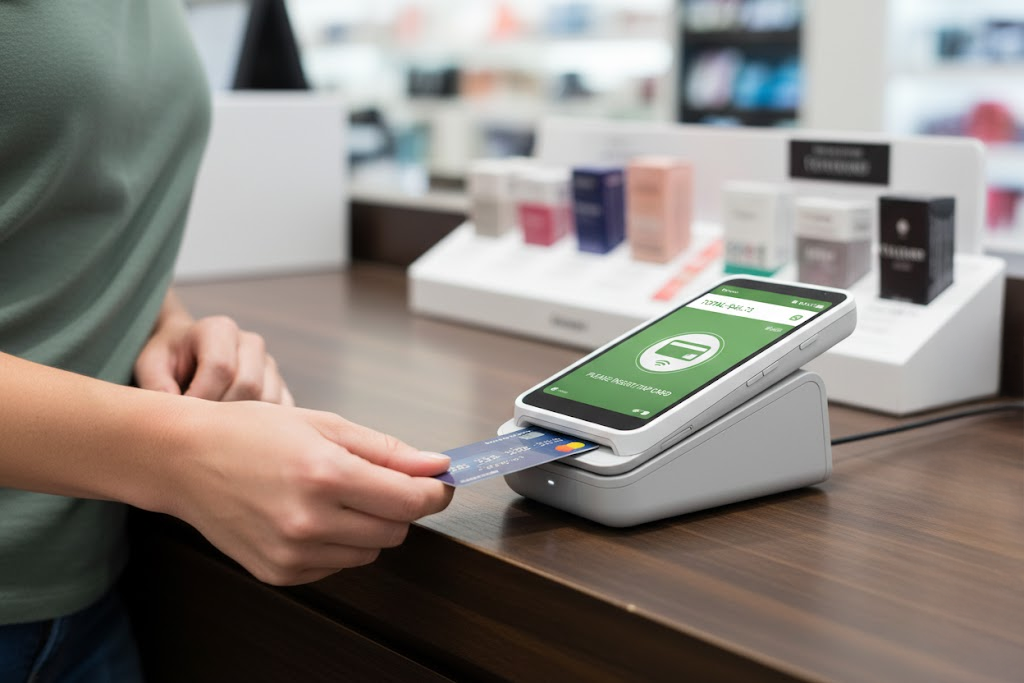
Dojo Card Machine: Independent UK Guide for Businesses
What Is a Dojo Card Machine? A Dojo card machine is a payment terminal supplied as
Get a quote in seconds with our simple form
Last updated 21/01/2026
A payment gateway is a digital tool that allows businesses to accept payments online. They work by facilitating payments from your customers’ banks to yours, doing so securely and quickly. They work alongside merchant accounts as part of the card processing process, assisting you in accepting online payments and making money online.
Payment gateways can often be plugged straight into your business’s website with ease, making them a quick and easy way to start taking payments online. They can work for both small and large businesses, and come with built-in features to protect customers against fraud and ensure a smooth transaction process. Best of all? A lot of them are free to install on your website.
A payment gateway is not the same as a payment processor, which facilitates the authorisation and settlement of payments between a business and its customers. Payment gateways collect the information needed from your customers to enable them to pay, while payment processors use the information to make the transaction happen.
A payment gateway is key to ensuring a transaction can go ahead, especially in the world of e-commerce. Because they form a crucial part of the payment process, knowing how payment gateways work is important for your business, which is exactly why we wrote this article.
Payment gateways are essentially the front-facing technology responsible for acquiring and sending customer information to your acquiring bank (where your merchant account is kept). Your acquiring bank will send the payment information to your customer’s card provider to check that the funds are available.
If there is enough money in the customer’s bank account, the card provider lets your acquiring bank know that the transaction can go ahead. Once this happens, your payment gateway can process the movement of funds.
If you operate online, your payment gateway will use a computer program to communicate with your customers’ banks. For in-person transactions, this communication is done via your business’s card machine. While in-person payment systems (often called EPOS systems) don’t always use payment gateways, online payments do, which makes this article far more important for those who want to sell online.
Please select the industry that you trade within. This information allows us to tailor your quote.
Assuming you’ve already got a merchant account, adding a payment gateway to your site is usually fairly simple, since a lot of merchant account providers out there can provide you with one as part of their overall package.
What’s more, you don’t even need an in-depth knowledge of webpage creation to install your payment gateway, as your merchant account provider can help you out with implementation.
If you haven’t already got a merchant account, you need one. If you have yet to get one, you should read our other material that goes through what merchant accounts are and which is the best merchant account for your business.
Payment gateway integration refers to the act of bolting on a payment gateway to your main business website; this is essentially the page that customers will be taken to when they complete their purchase. Obviously, what comes first is actually choosing your payment gateway provider, which will fit into one of the three descriptions broken down below…
Various payment gateway providers will enable your business to accept digital payments, with many of them offering different methods of doing so. The best payment gateway for your business will most likely be one of the three main types of payment gateway, which are:
A hosted payment gateway is one of the simplest ways to accept payment. All your website would have to do is have a payment link on the payment page which, when clicked, would take your customer to a separate payment page. Providers of hosted payment gateways include companies like PayPal and Amazon Pay, which have pages that customers are directed to from a separate website.
A hosted payment gateway has the advantage of being simple and relatively hassle-free, taking a lot of the stress away from your business. It does, however, mean your customers are taken away from your website when making payments, limiting your control.
A self-hosted gateway does largely what it says on the tin. Rather than being directed to a separate webpage, customers will see a payment page displayed within your business’s website, where they will enter payment details. Their card details are then sent to a third-party payment gateway to be authorised.
This makes for a better customer experience as customers won’t be thrown onto a different website to make payment. You still lack full control, however, as you are unable to control the payment page itself.
API Hosted Gateways enable the entire payment process to occur on your website. Your website will host the payment and your servers will handle the data. This is more suited to bigger businesses that have large volumes of sales day-to-day.
One thing to remember is you’ll need to pay extra for SSL certification, and also ensure that the payment process is PCI DSS compliant if you want to use this kind of payment gateway.
While this article focuses on the payment gateways, we also have in-depth guides that fully explain all you need to know about taking payments. Explore below:
As we said earlier, many payment gateways are completely free to install and often come with zero monthly fees. This is the case for companies like Stripe (our top choice of merchant account) and PayPal, for example. This does not mean, however, that payment gateways are free to use.
Providers of payment gateways need to make their money, and they do that mainly via transaction fees. These fees vary from provider to provider, but usually fall between the 1%-2% mark. Some providers also charge a fixed fee as part of their transaction fee; Stripe, for example, charges 1.5% + 20p for most of its transactions.
There’s also a typically higher fee for online payments (also known as card-not-present payments). This is due to a higher incidence of fraud with these kinds of purchases, and so your payment gateway provider faces an increased risk of chargebacks.
The best way to take electronic payments depends on the specific needs of your business. If you’re a small business that has limited knowledge or resources at your disposal, then using a hosted gateway could be the best option for you.
Something else to consider is the nature of your business. Is it fully online or do you have any physical shops? If you do have a physical shop, you’ll need a card machine to accept electronic payments, which means choosing not just a payment gateway, but also a card machine.
To help you compare all of these things side by side, we’ve created a list of what we consider the best payments gateways available in the UK.
A payment gateway allows businesses to accept, process, and manage customer payments. They are mainly used for online purchases but are also widely used for in-person transactions.
There are several things to consider when you choose a payment gateway including transaction fees, supported payment methods, and security features.
One of the most important things for your business could be the ease of integration a payment gateway has. A fully integrated payment gateway could be your best option if you want to have a hassle-free way of accepting payments, as there are fewer things for you to worry about.
No, not technically. Payment gateway alternatives, like payment links, can still allow you to take payments online. Payment links take your customers to a separate page, one that belongs to your merchant account provider and not your website. This circumvents the need for your own payment gateway.
This is a good option for businesses that don’t want the responsibility of PCI compliance, as such responsibilities are taken by the merchant account provider’s website, not yours.

What Is a Dojo Card Machine? A Dojo card machine is a payment terminal supplied as

What Are Stripe Payments? Stripe Payments is a payment processing service provided by Stripe that allows

Your business needs a card machine that’s suited to you and your customers: here’s our breakdown




CommercialExperts.com helps savvy UK businesses to save time and money by comparing a wide range of essential products and services.
© TFLI 2025 All rights reserved. Licenced by the Information Commissioners Office, (Registration Number Z3585914) Registered in the UK, number 08424810. Registered Office Address: First Floor, Beechwood Court, Springwood Way, Tytherington Business Park, Macclesfield, Cheshire. SK10 2XG.